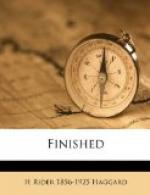Then we both laughed and he said—
“Tell me, Mr. Quatermain, if you will, what those Boers are saying behind us. I am sure it is something unpleasant, but as the only Dutch I know is ‘Guten Tag’ and ‘Vootsack’ (Good-day and Get out) that takes me no forwarder.”
“It ought to,” I answered, “for the substance of their talk is that they object to be ‘vootsacked’ by the British Government as represented by Sir Theophilus Shepstone. They are declaring that they won the land ‘with their blood’ and want to keep their own flag flying over it.”
“A very natural sentiment,” broke in Anscombe.
“They say that they wish to shoot all damned Englishmen, especially Shepstone and his people, and that they would make a beginning now were they not afraid that the damned English Government, being angered, would send thousands of damned English rooibatjes, that is, red-coats, and shoot them out of evil revenge.”
“A very natural conclusion,” laughed Anscombe again, “which I should advise them to leave untested. Hush! Here comes the show.”
I looked and saw a body of blackcoated gentlemen with one officer in the uniform of a Colonel of Engineers, advancing slowly. I remember that it reminded me of a funeral procession following the corpse of the Republic that had gone on ahead out of sight. The procession arrived upon the stoep opposite to us and began to sort itself out, whereon the English present raised a cheer and the Boers behind us cursed audibly. In the middle appeared an elderly gentleman with whiskers and a stoop, in whom I recognized Mr. Osborn, known by the Kaffirs as Malimati, the Chief of the Staff. By his side was a tall young fellow, yourself, my friend, scarcely more than a lad then, carrying papers. The rest stood to right and left in a formal line. You gave a printed document to Mr. Osborn who put on his glasses and began to read in a low voice which few could hear, and I noticed that his hand trembled. Presently he grew confused, lost his place, found it, lost it again and came to a full stop.
“A nervous-natured man,” remarked Mr. Anscombe. “Perhaps he thinks that those gentlemen are going to shoot.”
“That wouldn’t trouble him,” I answered, who knew him well. “His fears are purely mental.”
That was true since I know that this same Sir Melmoth Osborn as he is now, as I have told in the book I called Child of Storm, swam the Tugela alone to watch the battle of Indondakasuka raging round him, and on another occasion killed two Kaffirs rushing at him with a right and left shot without turning a hair. It was reading this paper that paralyzed him, not any fear of what might happen.
There followed a very awkward pause such as occurs when a man breaks down in a speech. The members of the Staff looked at him and at each other, then behold! you, my friend, grabbed the paper from his hand and went on reading it in a loud clear voice.




